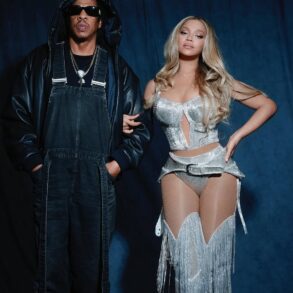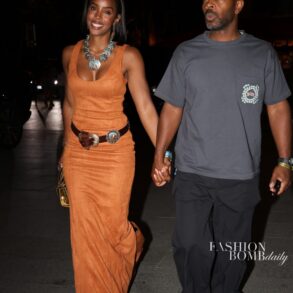A cultural shift that started 50 years ago in the Bronx, New York wouldn’t be what it is without 1086 East 17th Street in Winston-Salem.
It was at that Cleveland Avenue Homes address where a 7-year-old Patrick Douthit, who was visiting his cousin, heard his first hip-hop song, “Planet Rock” by Soulsonic Force.
“It turned my world upside down,” Douthit said.

Patrick Douthit, professionally known as 9th Wonder, laughs with the audience as he talks about hearing his first rap song, “Planet Rock” by Afrika Bambaataa and the Soulsonic Force. Douthit was speaking at Triad Cultural Arts and Arts Council’s “Celebrating 50 Years of Hip Hop with 9th Wonder: A Master Class and Panel Discussion.”
Forty-one years later, Douthit, now known as the Grammy award-winning producer, 9th Wonder, has returned the favor to hip-hop, helping turn others’ worlds upside down. He’s turned old classics into new vessels on which artists like Jay-Z, Kendrick Lamar and North Carolina’s own J. Cole have told their stories.
Last week, 9th Wonder shared some history and his personal relationship with hip-hop, at Reynolds Place Theater, just two miles from where his journey started. In front of a sold-out audience, he presented a “master class” of the genre’s origins and evolution and was later joined by panelists to celebrate and discuss 50 years of hip-hop.
People are also reading…
The event was held by Triad Cultural Arts and the Arts Council of Winston-Salem and Forsyth County.
“If you think about rock, jazz, blues, anything else, we’re the youngest,” 9th Wonder said. “Even though we’re the youngest, the worldwide phenomenon of hip-hop has stretched past race, color, creed, gender, languages. It’s as universal as math.”

9th Wonder plays some James Brown during his seminar.
The Master Class
For 9th Wonder, who has taught about hip-hop at Wake Forest, Duke, Elizabeth City State and Harvard, this master class was different.
It was the first time he lectured in front of his parents, Elmore and Patricia Douthit. 9th Wonder’s mother served as a teaching assistant with Winston-Salem/Forsyth County Schools for 46 years, and his father is a retiree of R.J. Reynolds Tobacco Company.
The presentation was also different because 9th Wonder shared his story in front of those who were a part of it, including his 12th grade teacher Fleming El-Amin. El-Amin, a former Forsyth County commissioner, introduced 9th Wonder to the crowd and presented him with a proclamation from the Forsyth County Board of Commissioners recognizing the 50th anniversary of hip-hop and 9th Wonder’s contributions.
Mayor Allen Joines also recognized July 24, 2023 as “9th Wonder” Day.
“It’s a fulfillment of a dream almost been realized in this life,” El-Amin said. “When you see a student of yours evolve to the point where he’s evolved, it’s just a blessing.”
9th Wonder’s presentation began well before the release of Sugar Hill Gang’s “Rapper’s Delight” in 1979, otherwise known as the first hip-hop song.
He traced the genre’s history back to the West African griots who were truth tellers in tribes prior to 1600. The griots laid the foundation for the tradition of which the African diaspora passed down messages by word of mouth.
During chattel slavery, that tradition turned into spirituals that were often coded messages that only the enslaved could understand. Those spirituals then evolved into the gospel and soulful music 9th Wonder’s parents listened to.

Bryon Turman and Chelii Broussard laugh as 9th Wonder talks about the music he grew up on during “Celebrating 50 Years of Hip Hop with “9th Wonder: A Master Class and Panel Discussion.”
“It seemed like in the 1970s when I was born, my house started to sound like a funeral home a little bit,” 9th Wonder joked. His parents often listened to artists like James Cleveland, Mighty Clouds of Joy, The Clark Sisters and Luther Vandross.
At the same time, disco and funk rose in popularity, introducing a different sound and way of life when it came to fashion. DJ Kool Herc, originally from Jamaica, brought soundboards to block parties in the Bronx in 1973, and at those parties, he created “the get down”, or repeated loops of drum breaks from those funk records.
That new sound was the beginning of hip-hop.
Sylvia Robinson, a Black woman credited as the first CEO of hip-hop with her label, Sugar Hill Records, paid attention to the movement, studying what was happening at Studio 54 in New York City. One of the songs played at Studio 54 was Chic’s “Good Times” which Sugar Hill Gang sampled to birth hip-hop records.
“Sylvia Robinson saw the duality of what was going on in New York City at the time and was faced with one thing called Reaganomics,” 9th Wonder said. “Reaganomics was tearing the city apart, and Sugar Hill Gang was when hip-hop was happy and was having a good time…At the same time we also needed another side of hip-hop.”
That brought 9th Wonder to “The Message” released in 1982 by Grandmaster Flash and the Furious Five. That record became the driving force behind conscious rap.
9th Wonder emphasized how records that came after “The Message” became a source of knowledge as Black people began to learn more about their history from artists such as Public Enemy and KRS-One.
Schools, for the most part, only taught about Martin Luther King, Rosa Parks, George Washington Carver and Booker T. Washington. Hip-hop went deeper, teaching about Black inventors, revolutionaries and ideals such as Pan-Africanism.

9th Wonder samples a few beats during his discussion.
Yet, it wasn’t just the lyrics providing a history lesson. The music behind the words had their own layers and depth through sampling — 9th Wonder’s expertise.
“It’s also a literary sense,” 9th Wonder said. “It’s all about what you hear, knowing the importance of the history of sound. A lot of us producers and DJs are vinyl archaeologists.”
Ariel Smith, host of “The Food Truck Scholar” podcast and an attendee of 9th Wonder’s event, said the most interesting part of the lesson was 9th Wonder’s in-depth discussion on sampling.
“It’s DNA, lowkey,” Smith said. “It’s a lineage. When you’re listening to one song, you’re listening to like eight, and when you’re listening to an album, you’re not listening to just 12, you’re listening to 50. And, when you’re listening to those other songs, you’ve got to figure out what inspired those songs and why were those songs selected to be a part of this song?”
9th Wonder said he has to go through thousands of records at the record store before finding music worth sampling for a beat. Whether the song is a hit or not doesn’t matter — it’s about picking the most infectious part of a song.
For Pete Rock, a producer, in 1992, the most infectious part of Tom Scott and The California Dreamers’ “Today” was the saxophone melody at the 1:38 mark used to make “They Reminisce Over You.” That record helped inspire 9th Wonder to become a producer.

Patricia (center) and Elmore Douthit (far left) had front row seats for their son’s event.
“Sampling is such a bad term when it comes to hip-hop because they say that we’re stealing,” 9th Wonder said. “If you’ve ever been to school, everything you do or everything you’ve been taught is a remix of what you’ve heard before…Reformulate our thoughts, words, ideas to teach the next generation. That is what’s important.”
The Next Generation
When it comes to contemporary mainstream hip-hop, 9th Wonder probably isn’t playing it in his car.
It’s not because it doesn’t have a place in the culture. The youth’s version of hip-hop just doesn’t speak to 9th Wonder, a 48-year-old man, in the same way it speaks to a 14-year old, and that’s ok.
“Everybody has a right to tell their story,” 9th Wonder said. “No matter if you agree with the story or not. Sometimes hip-hop shows the ugly underbelly of this country, or what is done to a kid in this country.”
At Monday’s event, panelists, including Forsyth County Sheriff Bobby Kimbrough Jr. and District Court Judge Fred Adams, discussed why hip-hop has lasted so long and where the culture is headed.
Kimbrough, who has been dealing with a high number of homicides in Forsyth County this summer, brought up concerns about violent lyrics in contemporary rap and whether those lyrics are influencing Black youth to take each other’s lives.
9th Wonder said that issue may be bigger than hip-hop.
“That comes from somewhere,” 9th Wonder said. “It comes from kids being forgotten about from second or third grade and put on this side and told that they’re bad because of how they dress or how they look. It comes from impoverished neighborhoods … If a kid is making a song like that, that kid is actually trying to tell somebody something.”
Bryon Turman, a hip-hop professor at N.C. A&T State University, who was also a panelist, hopes hip-hop will stick around based on his observations on how Black people have maintained their culture when “creative chains” are broken.
“I think that as Black Folk, we’ve always found ways outside of the established methods to maintain our culture,” Turman said. “One of the things that the majority of folks have done to us, particularly within education, is they’ve disconnected our creative chains so that somehow spirituals have no connection to Africa. Somehow blues has no connection to spirituals.”
Turman said, “Hip-hop comes, and it shows connectivity.”
Panelists also talked about how computer software and music streaming have made listening and creating hip-hop a more accessible process for anyone in the world interested in the culture. This has also sped up the process of innovation and evolution in the genre.
Kevin Rowsey, a Triangle-based hip-hop artist and educator known as “Rowdy,” said he’s excited about the new generation’s move away from record labels.
“I’m very excited about how there’s been more power to the independent artist,” Rowdy said. “Not only do we have like more of a variation of different artists in hip-hop, but those artists are staying true to their craft and have the infrastructure and the means to do their thing on the level that they want to do it at without necessarily having to go through major support.”
Hip-hop has found its way into new regions, especially North Carolina. Since North Carolina pioneers, including 9th Wonder, hit the scene, the state has been on the rise as a hip-hop center with J. Cole and Morray from Fayetteville, Rapsody from Snow Hill, Toosii from Raleigh, DaBaby and Reuben Vincent from Charlotte and TiaCorine from Winston-Salem.
“I just feel like the hip-hop culture in North Carolina — as important as the south is, as important as the mecca of Atlanta is — specifically these triangulated, heavy and growing metropolitan areas, are about to bring a new wave of southern hip-hop,” Rowdy said.
That wave is arguably already rolling. When it’s all said and done, the history made by the many centers of North Carolina hip-hop will be traced back to the African griots just like its predecessors.
But, it had to make a stop at 1086 East 17th Street in Winston-Salem.
GALLERY: 9th Wonder presents 50th anniversary of Hip Hop

Patrick Douthit, professionally known as 9th Wonder, laughs with the audience as he talks about hearing his first rap song, “Planet Rock” by Afrika Bambaataa and the Soulsonic Force. Douthit was speaking at Triad Cultural Arts and Arts Council’s “Celebrating 50 Years of Hip Hop with 9th Wonder: A Master Class and Panel Discussion.”

Patrick Douthit, professionally known as 9th Wonder, talks about growing up in Winston-Salem during a press conference before his discussion “Celebrating 50 Years of Hip Hop with 9th Wonder: A Master Class and Panel Discussion” on Monday, July 24 at Milton Rhodes Center for the Arts.

9th Wonder samples a few beats during his discussion.

9th Wonder plays some James Brown during his seminar.

9th Wonder plays some of the music that influenced him during Triad Cultural Arts and Arts Council’s “Celebrating 50 Years of Hip Hop with 9th Wonder: A Master Class and Panel Discussion” on Monday, July 24 at the Milton Rhodes Center for the Arts.

9th Wonder discusses his process of sampling during a press conference before his discussion “Celebrating 50 Years of Hip Hop with 9th Wonder: A Master Class and Panel Discussion” on Monday, July 24 at Milton Rhodes Center for the Arts.

9th Wonder talks about growing up in Winston-Salem during a press conference before his discussion “Celebrating 50 Years of Hip Hop with 9th Wonder: A Master Class and Panel Discussion” on Monday, July 24 at Milton Rhodes Center for the Arts.

9th Wonder talks about some of the great artists of hip hop at Triad Cultural Arts and Arts Council’s “Celebrating 50 Years of Hip Hop with 9th Wonder: A Master Class and Panel Discussion” on Monday, July 24 at Milton Rhodes Center for the Arts.

Patrick Douthit, professionally known as 9th Wonder, samples a few beats during a break in his discussion “Celebrating 50 Years of Hip Hop with 9th Wonder: A Master Class and Panel Discussion” on Monday, July 24 at Milton Rhodes Center for the Arts.

Jodi Kimball, aka DJSK, serves as dj for 9th Wonder’s presentation “Celebrating 50 Years of Hip Hop with 9th Wonder: A Master Class and Panel Discussion” on Monday, July 24 at Milton Rhodes Center for the Arts.

Patrick Douthit, professionally known as 9th Wonder, wears a pair of Teyana Taylor Nike Air Jordans for the seminar “Celebrating 50 Years of Hip Hop with 9th Wonder: A Master Class and Panel Discussion” on Monday, July 24 at Milton Rhodes Center for the Arts.

Patrick Douthit, professionally known as 9th Wonder, wears a pair of Teyana Taylor Nike Air Jordans for the seminar “Celebrating 50 Years of Hip Hop with 9th Wonder: A Master Class and Panel Discussion” on Monday, July 24 at Milton Rhodes Center for the Arts.

Bryon Turman and Chelii Broussard laugh as 9th Wonder talks about the music he grew up on during “Celebrating 50 Years of Hip Hop with “9th Wonder: A Master Class and Panel Discussion.”

Elmore and Patricia Douthit had front row seats for their son, Patrick’s event at Triad Cultural Arts and Arts Council’s “Celebrating 50 Years of Hip Hop with 9th Wonder: A Master Class and Panel Discussion” on Monday, July 24.

Patrick Douthit, professionally known as 9th Wonder, talks about sampling beats from source material during Triad Cultural Arts and Arts Council’s “Celebrating 50 Years of Hip Hop with 9th Wonder: A Master Class and Panel Discussion”, Monday, July 24 at Milton Rhodes Center for the Arts.

Chelii Broussard emcees the panel discussion for Triad Cultural Arts and Arts Council’s “Celebrating 50 Years of Hip Hop with 9th Wonder: A Master Class and Panel Discussion” on Monday, July 24 at Milton Rhodes Center for the Arts.

Patricia (center) and Elmore Douthit (far left) had front row seats for their son’s event.

Patricia Douthit listens as her son, Patrick speaks at Triad Cultural Arts and Arts Council’s “Celebrating 50 Years of Hip Hop with 9th Wonder: A Master Class and Panel Discussion” on Monday, July 24.

Fleming El-Amin introduces one of his former Glenn High School students, Patrick Douthit, professionally known as 9th Wonder, for his presentation at Triad Cultural Arts and Arts Council’s “Celebrating 50 Years of Hip Hop with 9th Wonder: A Master Class and Panel Discussion” on Monday, July 24.

Fleming El-Amin, one of Patrick Douthit’s teachers at Glenn High School, listens during Douthit, professionally known as 9th Wonder, talks at Triad Cultural Arts and Arts Council’s “Celebrating 50 Years of Hip Hop with 9th Wonder: A Master Class and Panel Discussion” on Monday, July 24.

Rahman Gardner takes a series of photos in a 360-degree photo booth at a reception before Triad Cultural Arts and Arts Council’s “Celebrating 50 Years of Hip Hop with 9th Wonder: A Master Class and Panel Discussion” on Monday, July 24.

Sylvia Squire (from left), Eleanor Phillips-Phipps, Evelyn Acree and Cheryl Harry take a photo at a reception before Triad Cultural Arts and Arts Council’s “Celebrating 50 Years of Hip Hop with 9th Wonder: A Master Class and Panel Discussion” on Monday, July 24.
336-727-7279
This post was originally published on this site be sure to check out more of their content.





